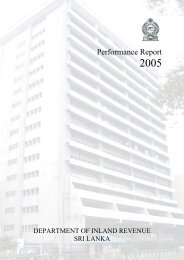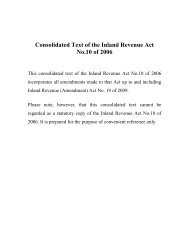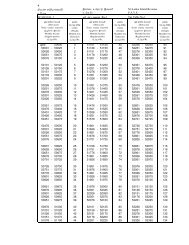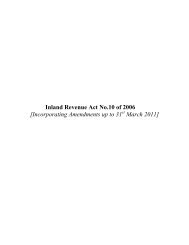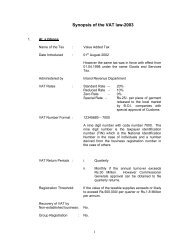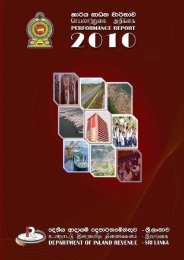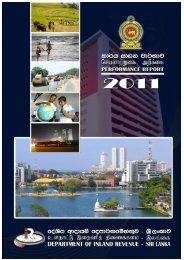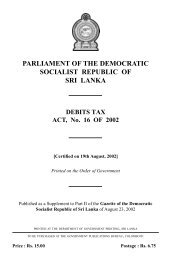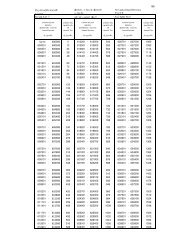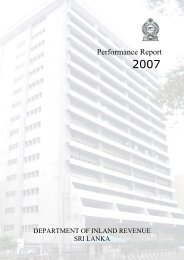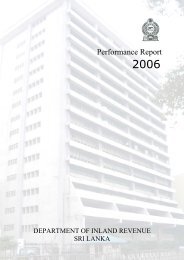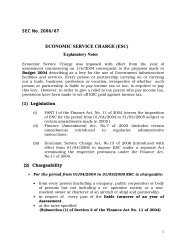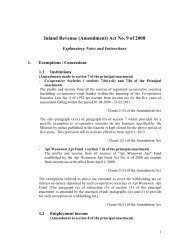VAT Guide to Value Added Tax - sri lanka inland revenue ...
VAT Guide to Value Added Tax - sri lanka inland revenue ...
VAT Guide to Value Added Tax - sri lanka inland revenue ...
Create successful ePaper yourself
Turn your PDF publications into a flip-book with our unique Google optimized e-Paper software.
sufficient communication of reasons. This is the most recent judgement on this issue.<br />
In these circumstances it was considered necessary <strong>to</strong> deviate from the more strict<br />
wording as appearing in the corresponding section of the Inland Revenue Act.<br />
This does not mean that the assessors should not exercise care in communicating why a<br />
return is rejected. The fact that most assessors, not being legal officers, may not be able<br />
<strong>to</strong> or may not find the time <strong>to</strong>, formulate reasons in a manner applicable <strong>to</strong> legal<br />
submissions, especially in a context where each one of them is required <strong>to</strong> handle an<br />
extremely large allocation (a few thousand files) is a sailent point <strong>to</strong> ponder. At times the<br />
reasons adduced in their letters of communications may be interpreted as conclusions<br />
rather than reasons. But the protection of government <strong>revenue</strong> as covered by these<br />
assessments, which are factually correct, is also of paramount importance. After all<br />
the purpose of the reasons is <strong>to</strong> enable an aggrieved party <strong>to</strong> formulate his grounds of<br />
appeal. In this scenario it was thought that if the assessments are correct on facts and<br />
law, leaving room in the legislation <strong>to</strong> annual assessments on a purely technical ground<br />
such as deficiency in the formulation of reasons by the assessor is not the proper thing<br />
because a genuine taxpayer who does not want <strong>to</strong> evade an issue can always get any<br />
doubts cleared if the (reasons) communication appear <strong>to</strong> be not clear or not adequate.<br />
However if a Registered Person is aggrieved by the assessment such person is not<br />
denied a fair hearing, under the rules of natural justice, which is a matter that succeeds<br />
the issue of an assessment (if aggrieved) and not a matter that preceeds the issue<br />
of an assessment. The Act provides a very clearly laid down procedure for the purpose<br />
of providing a fair hearing for an aggrieved party. While the procedural rules of natural<br />
justice have <strong>to</strong> be observed when the statuary provisions are silent on the procedure <strong>to</strong><br />
be adopted (and only when a taxpayers rights are affected by administrative action?) it<br />
must be emphasized that the <strong>VAT</strong> Act provides clearly the procedure <strong>to</strong> be adopted when<br />
an assessment is issued and when the assessee is aggrieved by the assessment.<br />
The view that the procedural rules of natural justice should be adhered <strong>to</strong> only when the<br />
taxpayers rights are affected by administrative action has also been considered . A<br />
taxpayers’ rights will be affected not when a charge sheet (i.e a notice of assessment) is<br />
issued but when and if the recovery proceedings are initiated without recourse <strong>to</strong> a<br />
hearing.<br />
Further, on the basis of a consensus reached at the GST review committee the<br />
assessors <strong>to</strong>o have been advised administratively <strong>to</strong> wait for one month as far as<br />
practicable, after the issue of the letter communicating why the return is rejected, so that<br />
81



